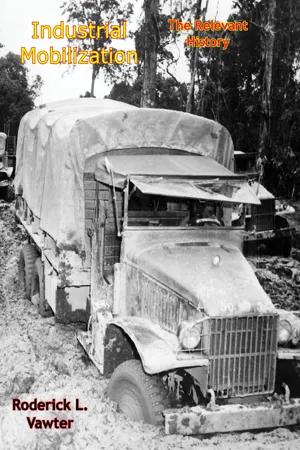
- 109 pages
- English
- ePUB (mobile friendly)
- Available on iOS & Android
eBook - ePub
About this book
Industrialization mobilization planning is an old idea in the history of modern warfare. In the United States, in fact, the National Defense Act of 1920 required the Federal Government to conduct such planning. Current reforms were inspired when, in 1978, a series of mobilization exercises revealed serious and dangerous deficiencies in mobilization planning. The basic premise of this historical study is that industrial mobilization lessons of the past provide answers for many of today's problems. The author contends that current industrial mobilization planners should draw lessons more from the Korean War effort than from World War II. The Korean mobilization effort supported not only the demands of that war, but also the readiness needs to counter an anticipated Soviet attack. After describing the Korean experience in detail, the author examines changes in industrial mobilization planning that evolved as the nation perceived an easing of the Soviet threat. He highlights problems that, should they remain unsolved, ultimately would preclude effective industrial mobilization planning. Finally, he recommends realistic actions to restore effective planning.
Frequently asked questions
Yes, you can cancel anytime from the Subscription tab in your account settings on the Perlego website. Your subscription will stay active until the end of your current billing period. Learn how to cancel your subscription.
No, books cannot be downloaded as external files, such as PDFs, for use outside of Perlego. However, you can download books within the Perlego app for offline reading on mobile or tablet. Learn more here.
Perlego offers two plans: Essential and Complete
- Essential is ideal for learners and professionals who enjoy exploring a wide range of subjects. Access the Essential Library with 800,000+ trusted titles and best-sellers across business, personal growth, and the humanities. Includes unlimited reading time and Standard Read Aloud voice.
- Complete: Perfect for advanced learners and researchers needing full, unrestricted access. Unlock 1.4M+ books across hundreds of subjects, including academic and specialized titles. The Complete Plan also includes advanced features like Premium Read Aloud and Research Assistant.
We are an online textbook subscription service, where you can get access to an entire online library for less than the price of a single book per month. With over 1 million books across 1000+ topics, we’ve got you covered! Learn more here.
Look out for the read-aloud symbol on your next book to see if you can listen to it. The read-aloud tool reads text aloud for you, highlighting the text as it is being read. You can pause it, speed it up and slow it down. Learn more here.
Yes! You can use the Perlego app on both iOS or Android devices to read anytime, anywhere — even offline. Perfect for commutes or when you’re on the go.
Please note we cannot support devices running on iOS 13 and Android 7 or earlier. Learn more about using the app.
Please note we cannot support devices running on iOS 13 and Android 7 or earlier. Learn more about using the app.
Yes, you can access Industrial Mobilization by Roderick L. Vawter in PDF and/or ePUB format, as well as other popular books in History & Military & Maritime History. We have over one million books available in our catalogue for you to explore.
Information
Table of contents
- Title page
- TABLE OF CONTENTS
- FOREWORD
- PREFACE
- THE AUTHOR
- EXECUTIVE SUMMARY
- Chapter 1 - STATEMENT OF PROBLEM
- Chapter 2 - HISTORY OF INDUSTRIAL MOBILIZATION PRIOR TO 1950
- Chapter 3 - HISTORY OF KOREAN WAR ERA
- Chapter 4 - INDUSTRIAL MOBILIZATION PLANNING IN THE YEARS BETWEEN KOREA AND VIETNAM
- Chapter 5 - VIETNAM WAR ERA
- Chapter 6 - DEFENSE INDUSTRIAL BASE ISSUES TODAY
- Chapter 7 - DEFENSE MOBILIZATION ISSUES
- Chapter 8 - SUMMARY OF RECOMMENDATIONS FOR ACTION
- Selected Bibliography